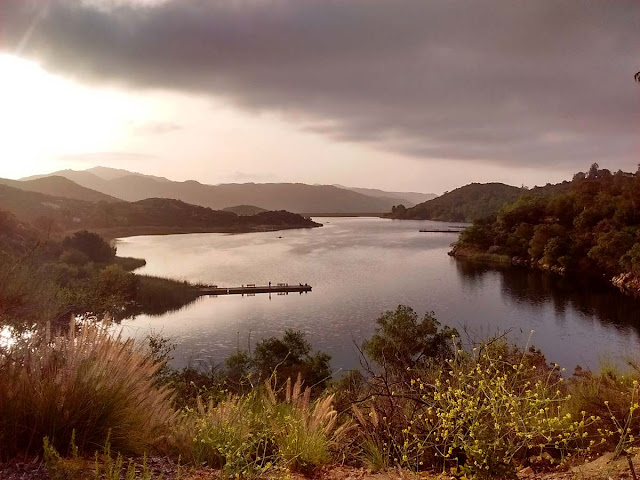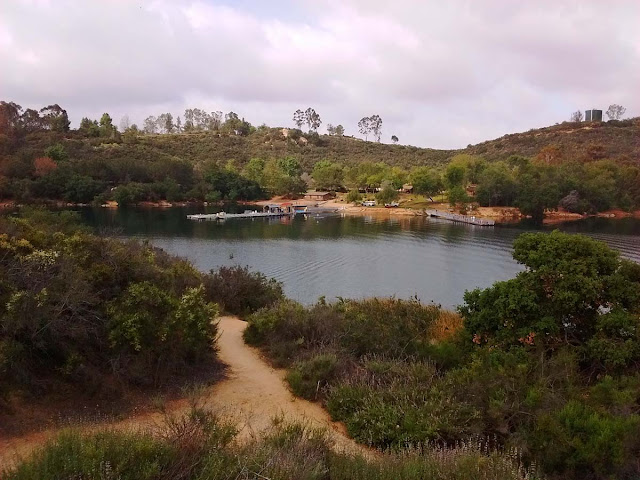Getting there: Exit 1-15 on El Norte Parkway in Escondido and head east 3.1 miles. After a large sweeping right hand curve turn left onto La Honda Drive (the sign for the lake is small and easily overlooked). After 1.3 miles you have arrived at the park entrance. Map navigation: near 2256 La Honda Dr., Escondido, CA 92027. Parking/vehicle entry: $5 weekends. Free for age 60+; Free on weekdays. Park free across the street in the Daley Ranch dirt parking area and walk in. No pets. No alcohol. No glass containers. Gate opens at 6:00 a.m. Web site.
Where to bird: The entry to the park off La Honda Drive is marked (A) on the map. If you have arrived on the weekend and don't want to pay the vehicle entry fee, park in the Daley Ranch Dirt Parking Lot. There are several options (outlined below) for birding, and one could take about 5-6 hours to explore the whole lake area.
Entry Picnic Areas: The picnic area immediately at the entrance (still A) has many trees and lots of birds, including migrants, in spring. There is an upper and lower (Jack Creek) picnic area. Some of the birds found here are American Robins, Dark-eyed Juncos, and Mountain Chickadees--all at elevations a bit lower than typical. Hermit Thrushes are regular in migration. A walk through the picnic area and around the ball fields is sure to reveal some good birds.
 |
| Picnic area at Dixon Lake |
 |
| Ball field at Dixon Lake |
Chaparral Nature Trail: This trail starts near the entry across the road from the picnic area at G on the map. The first part of the trail goes through some brushy trees in a wet ravine sure to have migrant warblers, vireos, grosbeaks, sparrows, flycatchers, and other birds. Heavy chaparral attracts many birds such as Wrentit, California Thrasher, Spotted Towhee, California Towhee, Bewick's Wren. This is a good area to find Rufous-crowned Sparrows, Black-chinned Sparrows, and Ash-throated Flycatchers in spring and summer. Joining the resident Anna's Hummingbirds you may find summer Black-chinned Hummingbirds and Costa's Hummingbirds. The trail goes straight east for a half mile (F) where it meets up with trails to Daley Ranch or switchbacks down to the lake, or leads back to the entrance following old roads on the north shore.
North Shore Hike: If you want to hike along the northern lake shore, there is a trail from C to E to F. The area around the dam is fenced off. Either walk back again or hike the rather steep switchbacks uphill to F and then back to the entry via a trail back to the rough roads or the Chaparral Trail (F to G). More below. It is about 2.4 miles to loop around from A-C-D-E-F-G-A.
North Shore Drive: A poorly maintained road, once paved, now full of potholes leads to 2 parking areas (C and D) with trails down to the lake and docks. If you don't want to hike the entire north shore, drive to the easternmost parking lot (D) and walk down into the Whisker Bay part of the lake (E). This is a quieter part of the lake and you may find marsh birds such as Common Gallinules, Marsh Wrens, and Black-crowned Night-Herons.
Dixon Lake Ranger Station: From the entrance you may drive to the right on the south side of the lake and stop at two small parking lots before getting to the larger parking lot at the Ranger Station (B). The lawns and trees around the ranger station are good for migrants in April. This is a good spot to scope out the lake for ducks: Mallards Gadwall, Ring-necked Ducks, Lesser Scaup, and Ruddy Ducks are the most common. You may find grebes of several species in winter. You may even find a few American White Pelicans. The trees will have tanagers, grosbeaks, and orioles in spring and summer, and Great-tailed Grackles will be obnoxious throughout the year.
Dixon Lake Trail: If you want to hike along the trail from the entry, past the Ranger Station and near the dam (A-B-dam, out-and-back) it is 2.1 miles. The dam itself is off limits and fenced.
Camping: The camping area (H) lies beyond the Ranger Station on the south side of the lake and is closed to non-campers. Camping spaces are up on the steep dry hills. Better birding in similar habitat is on the north side of the lake, so no need to be tempted to bird the camping areas unless you are actually camping.
 |
| View of Dixon Lake from the first parking lot on way to Ranger Station. |
 |
| View across Dixon Lake of the Ranger Station area. |
Check out the San Diego Birding Pages Dixon Lake site guide by Mary Beth Stowe (perhaps written before 2008).



No comments:
Post a Comment
I really want to hear from you! I've changed settings (again) in order to try to make commenting easier without opening it up to spammers. Please note, however, that comments to posts older than 14 days will be moderated. Thank you.